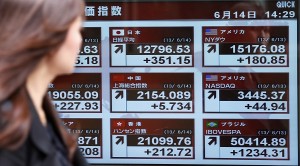Asian stocks down as Fed sees slower bond buys

A woman looks at an electronic stock board of a securities firm in Yokohama, near Tokyo, Friday, June 14, 2013. AP FILE PHOTO
MANILA, Philippines — Most Asian markets slid Thursday after the U.S. Federal Reserve said it could start scaling back its huge economic stimulus program later this year.
The announcement Wednesday in Washington drew sharp reaction in financial markets, showing just how dependent investors have become on the Fed’s easy money policies.
The Fed has been buying $85 billion worth of bonds each month to keep long-term interest rates low to boost borrowing and spending. On Wednesday, however, the Fed said the U.S. economy was strengthening, and Chairman Ben Bernanke said the bank’s purchases will likely slow down this year and end next year.
Normally, stock markets go up when the economic outlook improves. But occasional hints that the U.S. central bank would scale back its program have sent stock markets reeling.
“Any whiff there’s going to be reduction in the (Fed’s) ammunition is met with selling,” said James Camp, managing director of fixed income at Eagle Asset Management.
Tokyo’s Nikkei 225, the regional heavyweight, was down 1.1 percent at 13,101.53. Benchmarks in Indonesia, the Philippines, Thailand and Australia each fell more than 2 percent.
Hong Kong’s Hang Seng index tumbled 2.4 percent to 20,483.75 after a private survey showed a slowdown in manufacturing in China for the month of June. Mainland Chinese shares also fell. HSBC’s preliminary purchasing managers index fell to a nine-month low of 48.3 in June, down from 49.6 in May. Numbers below 50 indicate a contraction.
Jose Vistan, research director of Manila’s AB Capital Securities, said the declines in the Asian markets were still not as big as some of the big drops seen over the last two weeks.
“We’ve discounted the possibility of the winding down of the quantitative easing, so somehow we’re seeing a relatively tempered decline compared to the last couple of weeks,” Vistan said. He said the bias for the market is to correct to reasonable valuations after the winding down of extraordinary liquidity.
On Wall Street on Wednesday, the Dow Jones industrial average fell 1.4 percent to 15,112.19. The Standard & Poor’s 500 index fell 1.4 percent, to 1,628.93. The Nasdaq composite index fell 1.1 percent, to 3,443.20.
Benchmark oil for July delivery fell 98 cents to $97.50 per barrel in electronic trading on the New York Mercantile Exchange. The contract rose 67 cents to close at $98.44 a barrel on the Nymex on Tuesday.
In currencies, the euro fell to $1.3268 from $1.3274 late Wednesday in New York. The dollar rose to 96.68 yen from 96.54 yen.